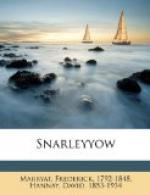Mr Vanslyperken took the gold from the table, made a bow, and retired from the royal presence.
The reader will acknowledge that it was impossible to play his cards better than Mr Vanslyperken had done in this interview, and that he deserved great credit for his astute conduct. With such diplomatic talents, he would have made a great prime minister.
“The council was ordered at twelve o’clock, my lords. These letters must be produced. That they are genuine appears to me beyond a doubt.”
“That they are faithful copies, I doubt not,” replied Lord Albemarle, “but—”
“But what, my Lord Albemarle?”
“I very much suspect the fidelity of the copier—there is something more that has not been told, depend upon it.”
“Why do you think so, my lord?”
“Because, your Majesty, allowing that a man would act the part that Mr Vanslyperken says that he has done to discover the conspiracy, still, would he not naturally, to avoid any risk to himself, have furnished government with the first correspondence, and obtained their sanction for prosecuting his plans? This officer has been employed for the last two years or more in carrying the despatches to the Hague, and it must at once strike your Majesty, that a person who can, with such dexterity, open the letters of others can also open those of his own government.”
“That is true, my lord,” replied his Majesty, musing.
“Your Majesty is well aware that suspicions were entertained of the fidelity of the syndic, suspicions which the evidence of this officer have verified. But why were these suspicions raised? Because he knew of the government secrets, and it was supposed he obtained them from some one who is in our trust, but inimical to us and unworthy of the confidence reposed in him.
“Your Majesty’s acuteness will at once perceive that the secrets may have been obtained by Mynheer Krause, by the same means as have been resorted to, to obtain the secrets of the conspirators. I may be in error, and if I do this officer wrong by my suspicions, may God forgive me, but there is something in his looks which tells me——”
“What, my lord?”
“That he is a traitor to both parties. May it please your Majesty.”
“By the Lord, Albermarle, I think you have hit upon the truth,” replied the Duke of Portland.
“Of that we shall soon have proof—at present, we have to decide whether it be advisable to employ him to discover more, or at once to seize upon the parties he has denounced. But that had better be canvassed in the council-chamber. Come, my lords, they be waiting for us.”
The affair was of too great importance not to absorb all other business, and it was decided that the house of Mynheer Krause, and of the Jesuit, and the widow Vandersloosh should be entered by the peace-officers, at midnight, and that they and any of the conspirators who might be found should be thrown into prison. That the cutter should be despatched immediately to England, with orders to seize all the other parties informed against by Vanslyperken, and that a force should be sent to attack the cave, and secure those who might be found there, with directions to the admiral, that Mr Vanslyperken should be employed both as a guide, and to give the assistance of the cutter and his crew.




